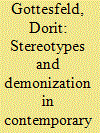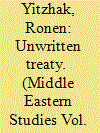|
|
|
Sort Order |
|
|
|
Items / Page
|
|
|
|
|
|
|
| Srl | Item |
| 1 |
ID:
178537


|
|
|
|
|
| Summary/Abstract |
2019 marked the 25th anniversary of normalizing Jordanian-Israeli relations and the ‘warm’ peace-making between the two countries. Representing key partners and neighbours in the Middle East, Jordan and Israel have maintained political and economic ties since 1994. The pro-Western stance of both countries, and their common interest in maintaining regional stability, led Jordan and Israel to pursue similar foreign policy aims regarding various regional upheavals, as well as the Palestine-Israeli dispute. Jordanian-Israeli relations have, however, been caught amidst shifts in the US’s Middle East Policy under the Trump administration, which has raised questions over the status of Jerusalem and the West Bank. With respect to these developments, this article argues that the disaccord between the US/Israel and Jordan over these two places reveals that a politics of identity remains a pillar of the Kingdom’s stability and survival. Although both countries are being confronted with the same regional challenges, particularly in the wake of the war in Syria, the re-emergence of the rhetoric of ‘Jordan is Palestine’ – which poses the country as an alternative homeland for Palestinians (al-watan al-badil) – nowadays constitutes the top security concern for the Hashemite monarchy, and has the potential to undermine Jordanian-Israeli relations going forward.
|
|
|
|
|
|
|
|
|
|
|
|
|
|
|
|
| 2 |
ID:
178535


|
|
|
| 3 |
ID:
178536


|
|
|
|
|
| Summary/Abstract |
Jordan had various expectations when it initially signed the peace treaty with Israel. The Jordanians believed that the peace with Israel, coming after the Oslo Accords, would pave the way for a strategic understanding with Israel on the establishment of a Palestinian state in the West Bank (including Arab Jerusalem) and Gaza. Such an understanding, they believed, would finally rid them of the nightmare of the ‘alternative homeland’ scenario, that ‘Jordan is Palestine’. Secondly the Jordanians assumed that the economic ‘fruits of peace’ with Israel would extricate Jordan from its perennial economic woes. Jordan would be both secure and prosperous. None of these assumptions actually materialized. The Jordanians are, therefore, profoundly disappointed by the treaty and its real results. They are as fearful as ever of the ‘alternative homeland’ scenario, and they are still suffering, as always, from an economy perpetually on the brink.
|
|
|
|
|
|
|
|
|
|
|
|
|
|
|
|
| 4 |
ID:
178538


|
|
|
| 5 |
ID:
178539


|
|
|
|
|
| Summary/Abstract |
This article examines the way in which the Israeli-Palestinian conflict, Israel and the Israelis are reflected in contemporary Palestinian writing in Jordan, taking the work of Nablus-born Jordanian author Samia ʿAtʿut as a case study. The article shows how, on the one hand, ʿAtʿut uses literary writing as a tool to reflect the mood of the people in relation to the Palestinian issue. On the other hand, through writing full of obscurity, sophistry and deception, and by the incorporation of political-national texts within collections of stories dealing mainly with social issues, ʿAtʿut manages to prevent her writing from being perceived as ideological, and transforms her work into texts that carry a deep and universal social message. The article shows that the Israel-Jordan peace agreement, the Jordanian establishment’s changing attitudes toward Israel, the contemporary trends of ‘personal’ literary writing, and the attempt to understand the ‘other’ that exists in the literary works of other contemporary female writers – all fail to overcome the writer’s abrasive opinions, which she expresses in seemingly ideological writing.
|
|
|
|
|
|
|
|
|
|
|
|
|
|
|
|
| 6 |
ID:
178534


|
|
|
|
|
|
|
|